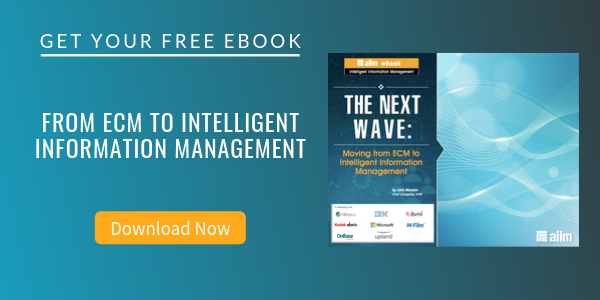
8 Benefits of an ECM Solution
Enterprise Content Management (ECM)
Implementing an ECM solution is a good thing, but how do you prove it? You identify some benefits that were realized as a result of the implementation and measure them, of course. However, unlike measuring Return on Investment (ROI) of the implementation itself, which only shows whether or not you recouped your implementation dollars, you need to establish a baseline to measure against to determine if your situation improved compared to what it was before you implemented ECM.
I’m not suggesting for a moment that you ought to abandon measuring the ROI of your ECM initiatives, I’m merely pointing out that ROI measurement will only tell a portion of the story. Another thing to consider is that ROI measurement typically only lasts for a (relatively) short time post-implementation, whereas benefit realization and measurement ought to continue over the life of the organization.
What Are the Benefits of an ECM Solution?
-
Reduced storage costs are a direct result of only storing what is absolutely required to be kept and getting rid of everything else.
A properly implemented ECM solution eliminates redundant or out-of-date copies/versions of content (physical and electronic), which leads directly to a reduction in storage requirements. Storage may be cheap, but the cost of running, maintaining, and managing storage is not.
-
Reduced operating costs can be achieved indirectly through reduced storage costs.
A reduction in operating costs can also be achieved directly by implementing, for example, imaging and workflow components of an ECM solution. Moving content around electronically is cheaper than moving the paper through an organization.
-
Reduced e-discovery costs are an obvious benefit of an ECM solution; less content kept means there’s less for the lawyers to get their hands on and less to have to examine.
-
Increased productivity is achieved by having the right information in the right hands at the right time.
Also, using workflows to automate routine or low-value tasks leaves more time/resources to execute the high-value tasks.
-
Improved work-life balance is realized because information workers that have good tools to work with spend less time working overtime and more time with their families.
This is one of those benefits that are typically harder (but not impossible) to quantify. Hint: measure sick days and staff turnover.
-
Increased customer satisfaction is a result of getting the answer the customer needs (not wants) when they want it.
If your Customer Service Representatives can solve the customers’ issues right away, your customers are going to be happy customers and stay with you. In these times, where the cost of customer acquisition is high, this could turn out to be one of the key benefits of an ECM solution.
-
Better decisions made faster can enable organizations to take advantage of opportunities and avoid unnecessary costs.
It’s true that we make the best decision we can with the information that’s available to us at the time; an ECM solution provides decision-makers with better information, faster.
-
Business continuity is served by making certain that the content you need to run your business is available, always.
A properly architected and implemented ECM solution takes into account backups, archives, near and off-line storage, and disaster recovery.
Conclusion
One of the cool things about the benefits of properly implemented ECM solutions is that they are cumulative. That means you’re getting more value for the same amount of effort (which is, coincidently, another benefit of ECM solutions).
Don’t think that just deploying an ECM solution will automatically provide benefits. The solution needs to be deployed in a manner that supports relevant controls and is planned out in a logical manner. You also need to put a benefits realization plan in place and stick to it. Lastly, it’s important to understand that an ECM solution that doesn’t integrate into line of business or other systems (e.g., business intelligence) will not provide as much benefit as an ECM solution that is part of an organization’s comprehensive information management strategy (i.e., the whole is greater than the sum of its parts).



